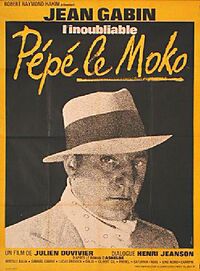Pépé le Moko: Difference between revisions
(Created page with "[[ | 200px | right | thumb |]] Category:Influences on Morrissey - Film and Television == Relevance == The samples used throughout Mention::You Were Good In Your Time are derived from this film.<br> An example:<br> In the Morrissey song at 3m12s,the following can be heard: < {{Page |DiscogsArtistId= |WikipediaPageTitle=Pépé_le_Moko }}") |
No edit summary |
||
| (10 intermediate revisions by the same user not shown) | |||
| Line 1: | Line 1: | ||
[[ | 200px | right | thumb |]] | [[File:Pepe-le-moko-sm-web.jpg | 200px | right | thumb |Pépé le Moko poster]] | ||
[[Category:Influences on Morrissey - Film and Television]] | [[Category:Influences on Morrissey - Film and Television]] | ||
== Relevance == | == Relevance == | ||
The samples used throughout [[Mention::You Were Good In Your Time]] are derived from this film.<br> | The samples used throughout [[Mention::You Were Good In Your Time]] are derived from this film.<br> [https://www.morrissey-solo.com/threads/you-were-good-in-your-time-who-is-it-about.94360/post-1053309 Information and translation] via member Sidney24 (2009).<br> | ||
An example:<br> | An example:<br> | ||
In the Morrissey song at 3m12s,the following can be heard: | In the Morrissey song at 3m12s, the following can be heard:<br> | ||
< | [[File:Good In Your Time Pepe clip.mp3]]<br> | ||
(audio taken from the film)<br> | |||
See also:<br> | |||
[[Jean Gabin]] | |||
{{Page | {{Page | ||
|WikipediaPageTitle=Pépé_le_Moko | |WikipediaPageTitle=Pépé_le_Moko | ||
}} | }} | ||
{{PageDate}} | |||
Latest revision as of 20:53, 27 March 2024
Relevance
The samples used throughout You Were Good In Your Time are derived from this film.
Information and translation via member Sidney24 (2009).
An example:
In the Morrissey song at 3m12s, the following can be heard:
(audio taken from the film)
See also:
Jean Gabin
Mentioned In
Wikipedia Information
 |
Pépé le Moko ([pe.pe lə mo.ko]) is a 1937 French film directed by Julien Duvivier starring Jean Gabin, based on a novel of the same name by Henri La Barthe and with sets by Jacques Krauss. An example of the 1930s French movement known as poetic realism, it recounts the trapping of a gangster on the run in Algiers, who believes that he is safe from arrest in the Casbah.
